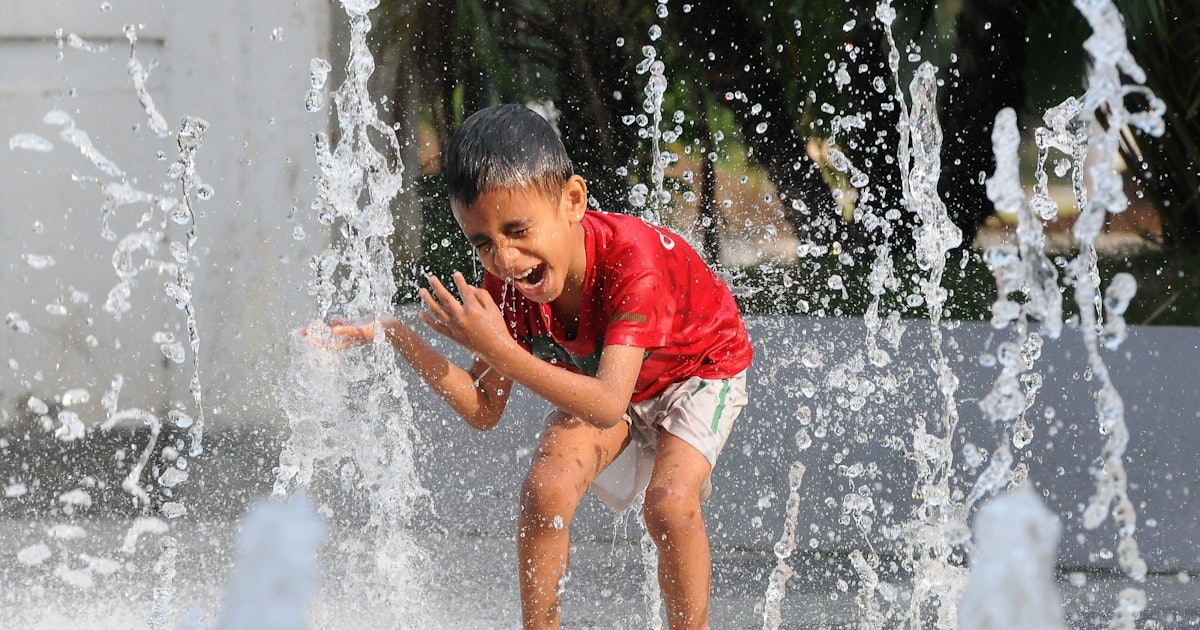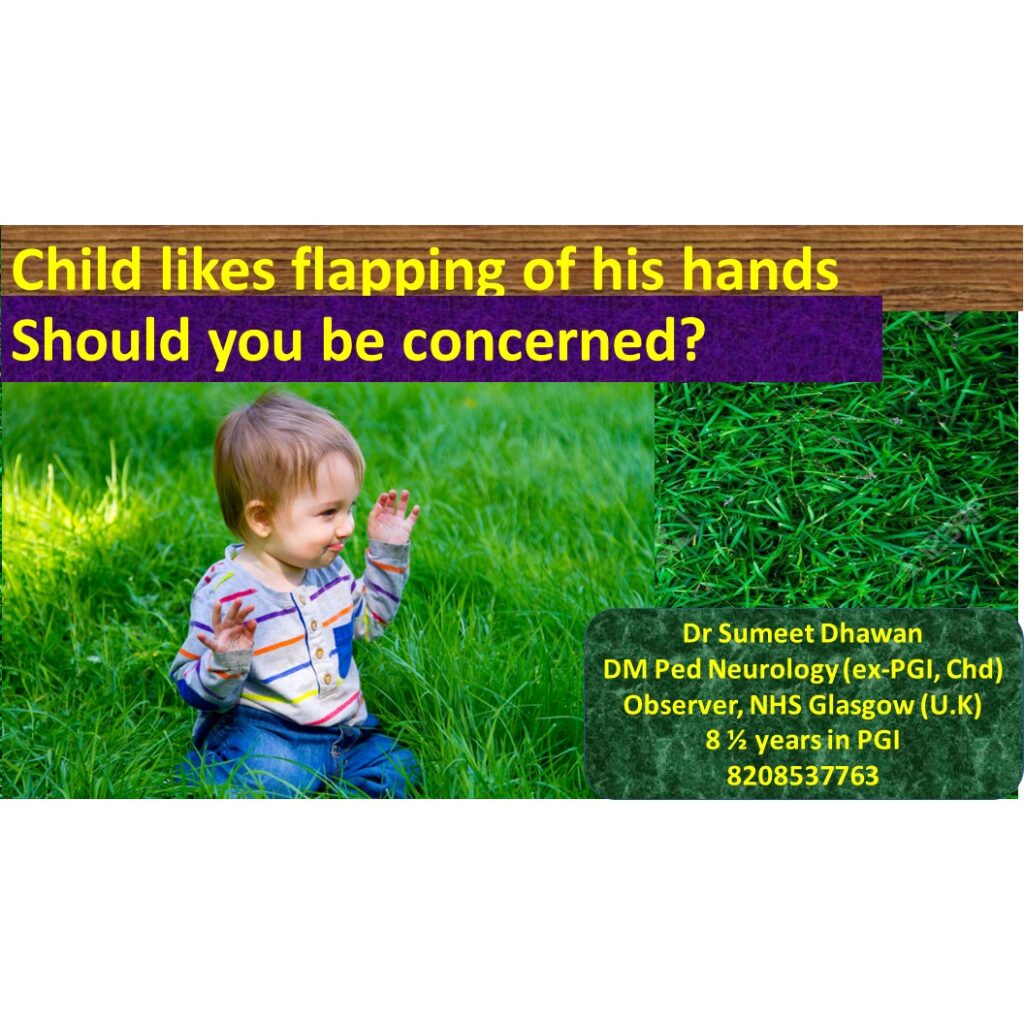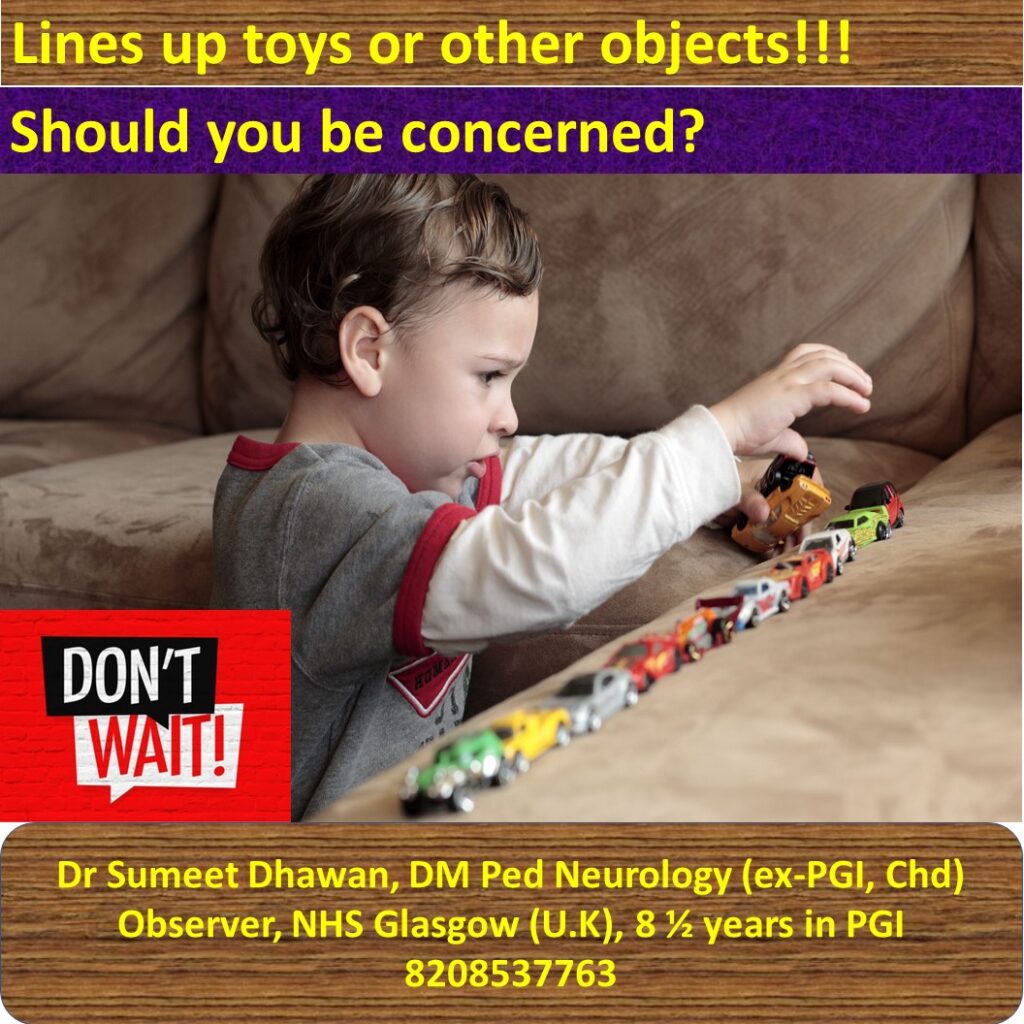I think I/my child may have autism but I’m not sure. How can I find out?
The main symptoms of a child with suspected autism are poor or limited with social interaction, poor communication, repetitive behaviours such as rotating himself/herself or rotating objects. Restricted interests such as playing with same toys in a same way repeatedly are also a key feature in autism. Common types of restricted interests include rotating or watching wheels of car, banging objects, playing with water tap repeatedly, opening and closing of doors repeatedly.
If you feel that you have any of these symptoms of autism, you need to contact specialist such as a paediatric neurologist, developmental paediatrician, pediatrician expert in development neurology or a child psychologist who can do behavioural evaluations
When should you suspect Autism?
Poor social communication and poor or no interaction with other children and family members
repetitive behaviours, repetitive interests, or repetitive activities
Symptoms that limit and impair daily functioning
What do you mean by poor social communication?
Delayed social smile
Poor or minimal eye-to-eye contact, poor facial expressions, abnormal body postures and gestures
Minimal or no sharing of enjoyment and interests with other people
Poor social interaction with other children and family members
What are behavioural symptoms seen in autism?
- Body rocking, hand flapping, spinning, rotation and tiptoe walking
- Fascination with certain numbers, letters, sequences of cars, sequences of utensils, sequences of alphabets, ritualistic schedule, certain objects, especially parts of a toy, like cars, switches, doors, revolving chairs
- Fixed adherence to routines or rituals like handwashing
What are the other clues on history and observation?
- Visual: Seeing things from a particular posture or angles
- Auditory: pretends to be nonresponsive to sounds, clapping hand over their ears, hearing close to objects
- Olfactory: Sniffing objects, foods
- Touch/taste: Refusing to eat food certain tastes or certain foods, mouthing of objects, compulsive touching of certain objects or textures, less response to pain, attachment to touch like tap water, or reluctance to bath
- Behaviour inappropriate to circumstances
- Excessive crying or laughing
Autistic child with repeated behavior like playing with water all the time

How is Autism diagnosed?
Autism is entirely a clinical diagnosis based on observation of child behaviour, child play and history by parents
Diagnostic Tools which may be used include
CARS (Childhood Autism Severity Scale)-severity.
ISAA
My child has some of these symptoms, but not all? Can it still be autism?
- All children with autism do not have all the symptoms and the frequency of these symptoms varies among different children. One of more symptoms may be predominant in autism
My child has good weight and can run around. Can it still be autism?
- Children with autism have good gross motor skills like running, jumping and climbing. They may have good intelligence as well like matching shapes, sorting out sizes and colours. However, children with autism have poor social AND expressive skills and restrictive interest. Their eye contact may be poor.
My child listens when I call him to take mobile. Or when he hears splashes of water. But he doesn’t respond when I call him. I think his hearing is, OK?
- As you observed, your child responds to only sounds or words of his interest like mobile, water, chocolate etc. This is meaning of restrictive interests. Restrictive or repeattive sympotms are one of core features of autism. When the child doesn’t respond consistently to commands of parents or name, the child is considered to be inattentive. inattentive is an early clue towards autism
My child can independently operate a mobile, can unlock the pattern, find out his you-tube video! But he doesn’t respond when I call him. And speaks very few words. Can it still be autism?
- As discussed above, child may have normal to high intelligence. Frequently, when the child is exposed to electronic media like mobile, you-tube, television, the child becomes so absorbed in these electronic gadgets that the child stops paying attention to human voices of parents.
- As exposure of child to electronic media is increased, the child become inattentive and doesn’t respond to name.
- Inattention, poor eye contact, self absorbed behavior are early symptoms of autism.
- Mobiles are not to be introduced in any child less than three years of age. We should not boast the child’s skills of operating a mobile. Children less than three years of age need to learn social behaviour and language, and not operating a mobile
How is autism diagnosed? Is there a test for it?
There is no test to diagnose autism spectrum disorder. The diagnosis is made based on observation of behaviour of child in play room or videos. The main characteristics for diagnosis include deficits in social communication and social interaction, and repetitive behaviours.
Certain tests like MRI brain, EEG test, hearing test like BERA test may be done in certain situations by the treating clinician. Blood tests may be done to exclude nutritional causes. The test is not to diagnose autism, but to exclude disorders which may have symptoms of autism and need separate test
What is the cause of my child’s autism?
In most situations, the exact cause of autism cause may not be identified. In most of the situations, behavioural changes in autism are caused by poor parent-child interaction, child playing alone, poor availability/ interaction with other children, misinterpretation of repeated behaviour as normal play. However, there are certain genetic disorders associated with autism such as Rett syndrome and fragile X syndrome. In approximately 25 percent of children with autism, a specific genetic cause may be found
None of the members of my family has autism. Is it possible?
- Autism has both genetic and environmental/family environment related causes. So, it is possible that there may not be any history of autism in any of family members. However, please assess if any member of your family had hyperactivity, ADHD, intellectual disability, epilepsy, seizures, or there is any marriage between closed related cousins/family members.
Is genetic testing needed? Can we tell which side of the family the autism came from? If there is no member with previous history of autism, do I need to get genetic testing done
If you are interested in genetic testing, you can ask your Paediatric neurologist or geneticist for explaining the test process. After a detailed history, your Paediatric neurologist may recommend genetic testing, which is a simple blood and urine test. These tests are specialised test and not available at routine laboratories. The reports of these testing take 1-2 months. Multiple genetic tests may be needed and each takes additional time. So, if you are planning a next pregnancy, we suggest that you get these complete evaluations before the pregnancy itself. Such tests cannot be done in pregnancy because of time constraint. The tests are not done to identify whether the gene came from which parent. Even if any of the parents has an abnormal gene, they may be unaffected throughout the lifetime. These genetic tests mainly help for planning the next pregnancy.
My parents say that all the siblings in the family spoke late, so I should wait. I am confused. What should I do?
- Speech delay alone is not worrisome, but early intervention causes no harm. The intervention or therapy needed in such a scenario includes behaviour medication and speech stimulation.
Causes of speech delay today and decade back are different. The electronic median like YouTube, mobile, TV were not available decade back. Parents were not working and only spent time with family. Speech delay along with poor eye contact, poor social interaction and repeated behaviour should prompt for early consultation with a specialist for evaluation of speech delay, autism and other behavior disorders. Clinical experience suggests that therapy modality like early intensive behavioural intervention, is useful in improving language and behaviour in individuals with autism.
I am very worried for the future of my child. I am concerned that my child will be less intelligent.
- Children diagnosed early for autism and managed with proper guidance and therapy improve in 6-18 months. Children who present late may have some behavioural abnormalities compared to other child. More often, children with autism may also have high intelligence because of their peculiar and sharp observation skills and restrictive interests. They may interpret complicated patterns with relative ease. So, it would be too early for us to worry for the intelligence of the child
What changes will I have to do in my lifestyles?
- . A lot of changes are needed in lifestyles of parents (especially in Indian context). We suggest child care leave for the mother for minimum of 3-6 months for complete care of child. In addition, mother must be relieved from all household activities like cooking, house-cleaning, etc. Maids for child care must not be involved. Mother should be involved in every activity of child like playing, dressing, bathing, and feeding. Mother is bridge for the child with the outside world. Maids and other family members can help in other household work. But the initial interaction is essentially the role of mother.
Can my child watch TV/mobile while eating?
- None of adults or children should watch TV/mobile while eating. Children learn behavioural skills from parents. Mother should try to interact with the child while eating. No other member should feed the child besides the mother
I am a working woman. I cannot take leave from my job. My child is in good hands of grandmother (dadi/naani)
- grandmother (dadi/naani) mainly attend to food, hunger and toilet demands of the child. They will want the child to play and not disturb them. Not uncommonly, because of lack of friends, the child learns to spend time alone with toying, talking to them. Most commonly, grandmother give the child rhymes and poem on YouTube. The child would be very happy. The grandparents are happy that the child is not disturbing alone
In this process, child learns to be alone. He loses interaction with other family members. He stops being attentive to parents’ voice. And gets angry, hyperactive and aggressive if his demands are not met. This leads to vicious cycle
I am confused about the diagnosis of my child. Some doctors say ADHD, hyperactivity, Autism or Speech Delay. What do I do?
- Sadly, doctors with expertise in child behaviour are few. Children with ADHD are always walking and moving around, but they respond to commands and name and may not show repetitive behaviours
Children with autism may have hyperactivity and aggressiveness. When demands, likes, needs of such children are not fulfilled, these children get angry, hyperactive and aggressive because of poor ability of expression with language.
Children with speech delay alone have good comprehension skills, normal social behaviour and no repetitive behaviours
However, the diagnosis can be made with precision by Paediatric Neurologist
What progress has been made so far in autism research?In the past five years, scientists have made significant progress in discovering the genes that contribute to autism. With this knowledge, there has also been much progress in understanding what might be different in the cells of the brain of a person with autism. Scientists in many fields are working toward a deep understanding of the mechanisms that lead to autism.Therapy options are easily available.
Are there any medicines for autism?
- Per se, treatment of autism is not medicinal. Multivitamins contains L-carnosine, omega 3 fatty acids, DHA may be used. Mood stabilisers may need to be used for children with emotional distress, aggression, hyperactivity and self-injury in autism. These medicines do not lead to improvements in social skills, language or communication in autism
What kind of behaviour Interventions are needed in autism? Is speech therapy useful?
- The initial goal of treatment or therapy is to improve attention and socialisation. Early interventions or therapy are focused on parent training and behavioural therapy. Such therapies alone can improve social skills, communication, language use and aggressive behaviours. Principles useful in therapy involve occupation therapy, physical therapy, behaviour therapy and psychotherapy, speech stimulation, and play therapy
What are poor social skills do I need to watch out for?
- Social communication and interaction can be difficult in children with autism
Examples of poor social communication and poor social interaction in autism include
Child avoids or does not keep eye contact
Child doesn’t respond to name by 9 months of age
Child doesn’t show facial expressions like happy, sad, angry, and surprised by 9 months of age
Child doesn’t play simple interactive games like pat-a-cake by 12 months of age
Child doesn’t wave goodbye by 12 months of age
Child doesn’t share interests with others
Child doesn’t show you an object that he or she likes by 15 months of age
Child doesn’t point by 18 months of age
Child doesn’t look at what you pointing by 18 months of age
Child doesn’t notice when others are sad by 24 months of age
Child doesn’t interest in peers
Child has trouble understanding other people’s feelings
Child cannot talk about own feelings at 36 months of age
Child doesn’t play games with turn taking by 60 months of age
What restricted or Repetitive Behaviours or Interests can be present in autism?
Lines up toys or other objects and gets upset when order is changed
Lines up cars, alphabets, utensils, colours and gets upset when order is changed
Repeats words or phrases over and over (
Plays with toys the same way every time like cars, buttons, blocks
Is focused on parts of objects (wheels of car, hinges of door, revolving chair)
Has selective interests with same toys again and again
Child flaps hands, rocks body, or spins self in circles, rotates in circles,
Likes playing with mud, water, wash basin again and again
Likes banging of objects repeatedly


An autistic Child keeps on rotating continuously


Do you need to tell her that she was autistic when she becomes old?
Eye contact-will it be improve with other people
How will there be touch sensitivity
Vision sensitivity for change in household
What is the current prevalence?
Incidence of Autism spectrum disorder in boys is 1 in 42 and in girls is 1 in 189. This 1 in 68 children may have autism, which is very common
Can you suspect or early diagnose Autism at an early age?
One must suspect Autism when there is lack of:
Response to own name by 8 months- rule out hearing disorder or neurological disorder
Babbling by 12 months- rule out hearing disorder or neurological disorder
Gesturing (pointing, waving bye-bye) by 12 months- rule out vision, hearing disorder or neurological disorder
Lack of Single words by 16 months- rule out hearing disorder. If physical or motor milestones are also delayed, rule out a neurological disorder
Lack of Two-word phrases by 24 months
Loss of any language or social skills at any age- rule out a neurological disorder
What are the co-morbidities?
Obsessive compulsive behaviour, intellectual disability, epilepsy, behavioural problems, food choices, eating mud or wall paint, sleep variability, altered mood, and hyperactivity (ADHD) may be present in some of the children with autism (but not all). The severity and frequency varies in different children
What are the sleep issues in autistic children?
- Difficulty going off to sleep
- Frequent awakenings
- Decrease in sleep time
When should genetic evaluation be done?
children with abnormal head size (small/large)
Children with positive family history
dysmorphic Children
How to train a child with Autism?
- Use visuals-flash cards, posters, idols for therapy
- avoid long strings of verbal instruction- simple instruction, frequent repetitions, simple sentences
- Use printed words and pictures on a flash card.
- Encourage child’s likes
- Use child’s fixations to motivate him to do school work
- Use concrete, visual methods to teach number concepts
- Interact with the child while swinging or rotating
- Don’t ask children to look and listen at the same time
- Use tactile learning materials (sandpaper alphabet)
